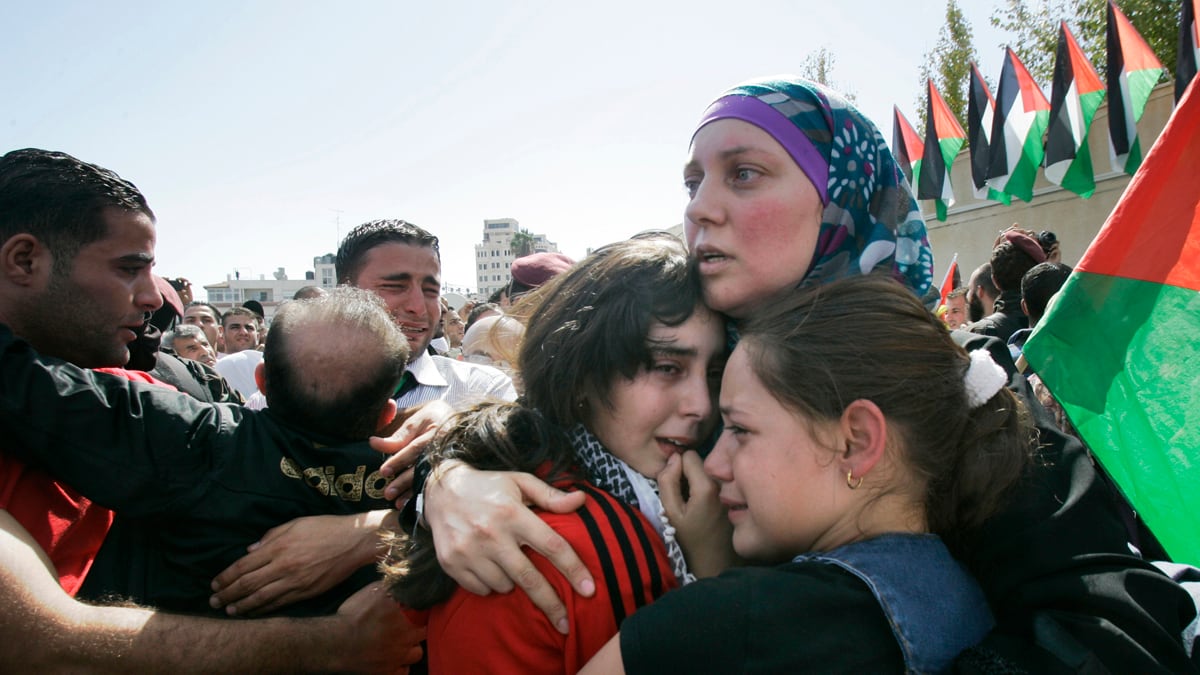If you happened to be reading the newspaper on Oct. 18, you probably came across some variation of this headline, which appeared in The Washington Post: “Gilad Shalit Reunited With Family in Israel; Palestinian Prisoners Freed.” It might have been accompanied by photographs of an emaciated Shalit saluting Benjamin Netanyahu at Tel Nof air base or hugging his parents, Noam and Aviva, on the tarmac, or it might have been published below the fold with no pictures at all, but it unfailingly mentioned the name of Gilad Shalit, the Israeli soldier who was held by Hamas for five years.
What the headlines didn’t mention on Oct. 18 is the name of a single Palestinian prisoner from among those who were released by Israel under the prisoner-exchange deal. Yet there were plenty of candidates to choose from—477 Palestinian men and women were released, with another 550 to be freed in the next few weeks. Even Egypt’s state television ran an exclusive interview with Gilad Shalit, rather than with one of the hundreds of Palestinians to whom it could have had access.
Names are not incidental or superfluous; they are vital. They tell the world something about our identity, gender, culture, or religion. They may change when we get married, immigrate to another country, or convert to another religion. They may even be erased when they remind us of something we would rather forget. Having a name means having a story; conversely, being denied it means having no story—no desires, no struggle, no suffering, no chance of redemption.
Over the last five years, we have heard the story of Gilad Shalit many times, and witnessed his parents’ appeals, their unbearable grief, and now their joyful reunion, but we have repeatedly been denied the opportunity to hear or feel Palestinians’ stories. Who are they? Which ones will be reunited with their families and which ones will, under the terms of their release, be exiled to Turkey or Egypt? Who are their loved ones? Who has written to them, dreamt of them, wept over them?

No one, if our newspapers are to be believed.
On the few occasions when Palestinian prisoners were named on Oct. 18, it was to point out that some of them had conducted terrorist attacks against Israel and to express Israelis’ anguish and fear that they might plan new attacks now that they are free. “Hard Feelings Test Hope in Israel-Hamas Deal,” was the title of one such article, which began by pointing out that the “next goal” of a woman “just off the bus in Gaza” after six years’ imprisonment was to “abduct more Israeli soldiers.” Meanwhile, nothing is said about the fear and anguish of the millions of Palestinians who live under Israeli military occupation. Not a word is spoken about the blockade of Gaza, now in its fourth year, which has turned Palestinian men, women, and children into prisoners on their own land, and denies them items such as fishing rods, musical instruments, size A4 paper, or even ginger.
The conflict between Israelis and Palestinians has gone on for decades. How can we hope for an end to it if we don’t learn to listen to the stories of both Israelis and Palestinians, feel the grief of both, and share the joys of both? Yet, for the moment, our media continue to give us mere glimpses of what is happening to the people of the West Bank and Gaza—two places that are also known by another name: the occupied territories.






